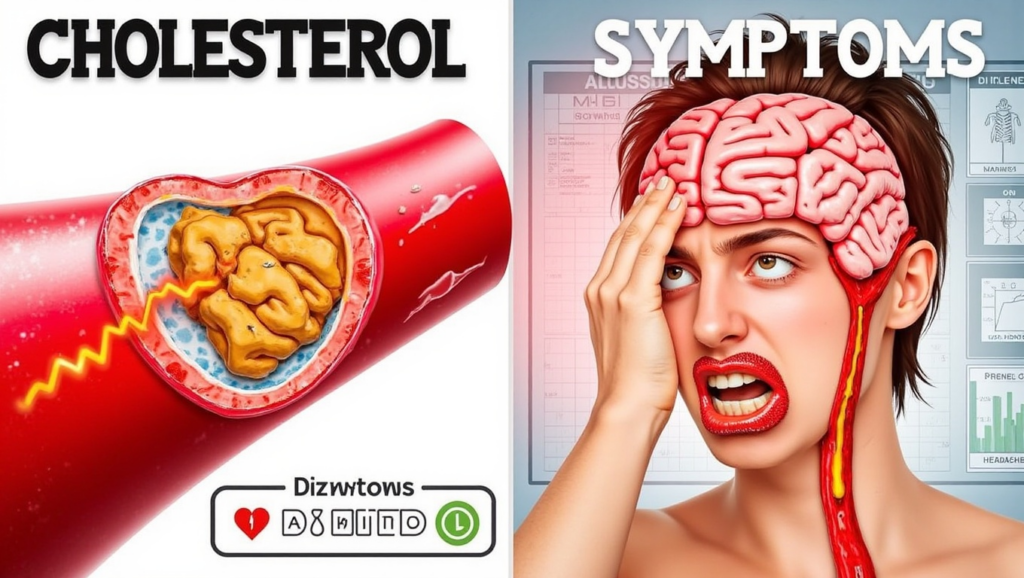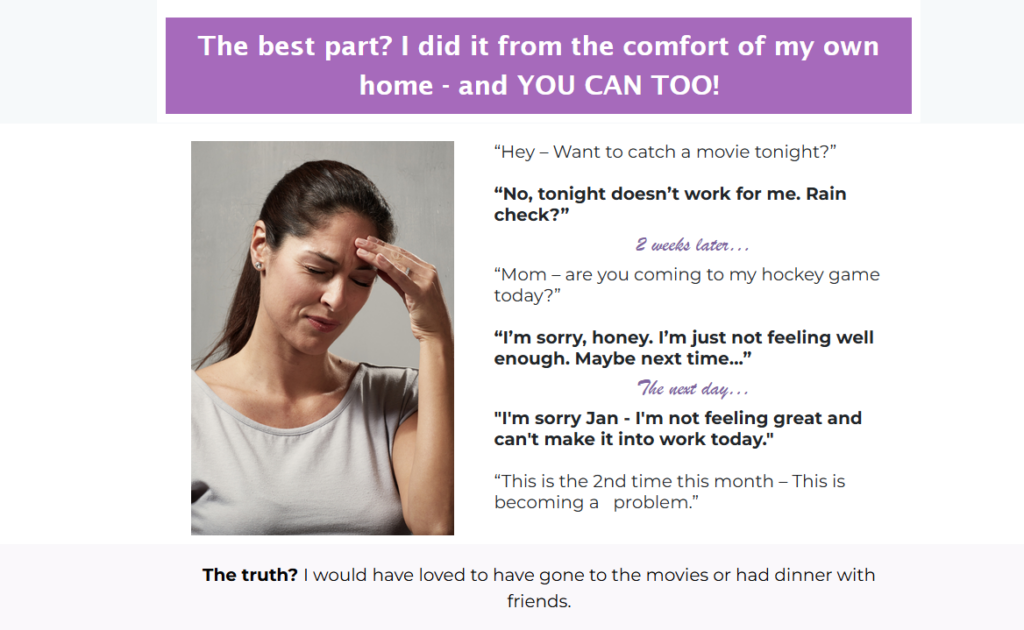
👉 Click Here to Try The Migraine and Headache Program Now
High cholesterol itself typically does not directly cause dizziness and headaches. However, it can contribute to conditions that may lead to these symptoms. Here’s a closer look at the possible connections:
How High Cholesterol Might Be Related to Dizziness and Headaches
- Reduced Blood Flow (Atherosclerosis)
- High cholesterol can lead to atherosclerosis, where fatty deposits (plaques) build up in the arteries, narrowing them and reducing blood flow to the brain.
- Reduced blood flow may cause dizziness, lightheadedness, and even headaches, especially during physical exertion or when blood pressure fluctuates.
- Hypertension (High Blood Pressure)
- High cholesterol is a risk factor for hypertension, which can lead to headaches.
- Persistent high blood pressure can strain blood vessels in the brain, sometimes resulting in dizziness and headaches.
- Transient Ischemic Attacks (TIAs)
- TIAs, often called “mini-strokes,” can occur when plaques partially block blood flow to the brain.
- Symptoms of TIAs may include sudden dizziness, headaches, confusion, or difficulty balancing.
- Carotid Artery Disease
- High cholesterol can contribute to plaque buildup in the carotid arteries, which supply blood to the brain.
- Narrowing or blockage in these arteries may cause dizziness or headache-like sensations.
- Secondary Effects
- High cholesterol may exacerbate other conditions, such as migraines or cardiovascular issues, which can manifest as headaches or dizziness.
👉 Click Here to Try The Migraine and Headache Program Now
- High cholesterol may exacerbate other conditions, such as migraines or cardiovascular issues, which can manifest as headaches or dizziness.
Symptoms to Watch For
If you experience frequent dizziness or headaches, especially with the following symptoms, it may indicate a more serious issue:
- Blurred vision or vision loss.
- Sudden weakness or numbness on one side of the body.
- Chest pain or shortness of breath.
- Difficulty speaking or confusion.
These symptoms could signal conditions like a stroke or severe cardiovascular issue and require immediate medical attention.
Managing High Cholesterol and Related Symptoms
- Lifestyle Changes
- Diet: Reduce saturated fats, trans fats, and cholesterol while increasing fiber-rich foods.
- Exercise: Engage in regular physical activity to improve circulation and overall cardiovascular health.
- Weight Management: Maintain a healthy weight to lower strain on your heart and arteries.
- Medications
- If prescribed, take cholesterol-lowering medications such as statins to manage your levels and reduce plaque buildup.
- Monitor Symptoms
- Keep track of any recurring dizziness or headaches and report them to your healthcare provider.
- Preventive Health Checks
- Regularly check cholesterol levels and blood pressure to monitor your cardiovascular health.
👉 Click Here to Try The Migraine and Headache Program Now
- Regularly check cholesterol levels and blood pressure to monitor your cardiovascular health.
Conclusion
High cholesterol alone doesn’t usually cause dizziness or headaches, but it can contribute to vascular issues or other conditions that lead to these symptoms. Managing cholesterol through lifestyle changes and, if needed, medication can improve overall health and help reduce the risk of associated complications.
If dizziness or headaches persist, consult a doctor to identify the root cause and receive appropriate treatment.
End Your Migraine Misery with The Migraine and Headache Program
If you’ve been trapped in the relentless cycle of migraines and headaches, struggling with pain that disrupts your life, there’s hope. The Migraine and Headache Program offers a proven, natural solution to break free from the agony—for good.
Why Migraines Keep Coming Back
Migraines aren’t random. They’re triggered by specific factors, including stress, diet, posture, and environmental changes. Treating only the symptoms with medication might provide temporary relief, but it doesn’t address the root causes.
That’s where The Migraine and Headache Program stands apart.
👉 Click Here to Try The Migraine and Headache Program Now
What Is The Migraine and Headache Program?
This program is a step-by-step guide that helps you:
- Identify Your Unique Triggers: Learn what’s causing your migraines and headaches so you can tackle the problem at its source.
- Apply Scientifically-Backed Techniques: Simple, natural methods to rewire your body’s response to triggers and eliminate migraines.
- Achieve Lasting Freedom from Pain: Say goodbye to costly medications, treatments, and recurring migraines.
Lisa’s Journey: A Case Study
Take Lisa Patterson’s story. For over 10 years, she suffered debilitating migraines, spending thousands on medications that didn’t work. Her migraines came every 10–12 days, leaving her unable to work, socialize, or enjoy life.
Then, she tried The Migraine and Headache Program.
Within just 3 weeks:
- Lisa had her last migraine ever.
- She went from frequent, disabling attacks to 14 months (and counting!) without a single migraine.
Lisa’s life was transformed—and yours can be too.
How the Program Works
- Natural and Drug-Free: No medications, treatments, or invasive procedures required.
- Easy-to-Follow Steps: Techniques that fit seamlessly into your life, addressing stress, posture, and other triggers.
- Backed by Science: Developed using validated medical research on migraine triggers and prevention.
What You’ll Gain
- Freedom from migraines and headaches—permanently.
- More energy to work, socialize, and spend time with family.
- A life free from the dread of your next attack.
👉 Click Here to Try The Migraine and Headache Program Now
Stop the Pain—Start Your New Life Today
It’s time to take control and leave migraines behind. Join the countless people, like Lisa, who’ve found freedom with The Migraine and Headache Program.
👉 Click Here to Try The Migraine and Headache Program Now
Don’t let migraines steal another moment of your life. Start your journey to relief today. You deserve it.


Dr. Sarah Miller is widely recognized as an influential leader in the healthcare field, with a career marked by excellence, innovation, and dedication to improving human well-being. Combining exceptional academic knowledge, clinical experience, and a deep commitment to research, she has become a reference in her specialty.






